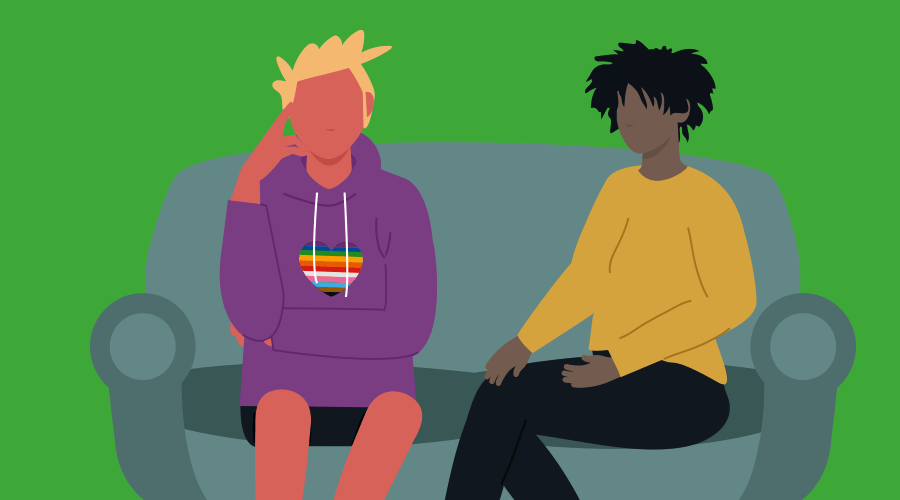Coming out

It is perfectly normal to feel unsure or worried about coming out as LGBTQ+, especially if you struggle to communicate your thoughts and feelings.
But being LGBTQ+ is a wonderful thing and makes you who you are. Being LGBTQ+ should be celebrated.
Three of our Youth Network members talk about their experiences of coming out as LGBTQ+, as an autistic young person. They discuss the challenges, and the positive impact living as their true authentic self has had on their health and wellbeing.
What does 'coming out’ as LGBTQ+ mean?
‘Coming out’ means telling someone something about yourself that they may not know already. So, if you were to come out as LGBTQ+, you might tell someone that you are a lesbian or that you are transgender.
Telling someone doesn’t mean you have that identity forever - it’s important to remember that gender identity and sexual orientation is a spectrum. For some people identity is fluid and can change over time, but for others this isn’t always the case.
Coming out as LGBTQ+ can be different for everyone, and it might feel more difficult if you’re autistic and struggle to communicate your words and feelings. It’s ok if it takes some time before you feel comfortable having that conversation with someone. You might prefer to write down or draw how you’re feeling or tell someone through a text message.
“I struggled with coming out, that struggle was also in many ways worsened by my autism. I didn’t know what was normal or okay to feel and to what extent my autism was clouding my judgments.”
Labelling your gender identity or sexual orientation might make you feel more confident in your identity and help you feel like part of a community. Labels are there to support you, not constrain you. This is similar to telling someone that you are autistic.
Vera, a member of the Youth Network, has found the concept used in an episode of Queer Eye of ‘letting in,’ rather than ‘coming out’ helpful.
“It can be helpful to exchange the term ‘coming out’ to ‘letting in.’ You are in control, and you are choosing to let others into your life should they choose to. No one has the power to reject you.”
Why do people choose to come out as LGBTQ+?
People choose to tell others they are LGBTQ+ for lots of different reasons. Some people want to be able to be their true selves and share that part of their life with others.
Hiding who you are can be difficult and may affect your health and wellbeing. It’s important to look after your wellbeing and do what feels right for you. Coming out as LGBTQ+ can be a positive experience, it can help you meet other like-minded people and even people to date.
For many people, coming out happens more than just once. When you meet someone new, at a new job for example, you might want to tell them your authentic identity. It gets easier every time.
Who do you want to tell?
It can be helpful to think about who you want to tell first. This should be someone you trust like a good friend, family member or teacher at school or college. They will be able to support you and help you tell other people if you want to.
Here are some questions to consider when deciding whether to come out.
- Who would be the first person you tell? It can be helpful to brainstorm individuals that you can rely on, trust, and open up to.
- What would be the best-case scenario? Eg. Everyone supports me and is happy that I choose to live as my authentic self.
- What would be the worst-case scenario? Eg. Some people don’t agree with who I am, but over time they will accept me.
- Is there a chance that coming out might put you at any sort of risk or endanger your ability to continue living at home?
Remember, it is your choice to come out and you do not have to come out to everybody in your life at once. You can choose who you want to come out to and when.
How can you start the conversation?
Some autistic people struggle to find the words to tell someone how they are feeling. Here are some things you could say to family or friends. Remember - everyone’s preference is different, and these are just some examples.
“There is something I want to tell you about the way I identify and how I have been feeling.”
“Can I talk to you about something personal?”
“I haven’t told many people this, so please don’t tell anyone. I am lesbian/gay/bisexual/transgender.”
“I’m not ready to talk about it in depth, but I wanted to let you know that I am LGBTQ+.”
If you don’t want to say it in person, you can write down how you are feeling in a letter or draw your thoughts. You may want to tell someone you trust and ask them to tell other people on your behalf. You should always do what is right for you, when it is right for you.

